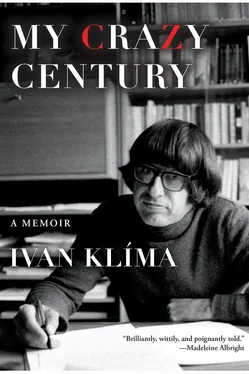I stood in for the emcee and announced that the opening number — an Italian revolutionary song, “Bandiera Rossa”—would not be performed because Fabri’s father had unfortunately died. Also, the next satirical piece, which was supposed to take us directly to the floor of the UN, would not be performed because both of its protagonists had left for a conference in Ostrava. Then I invited the women’s trio to perform folk songs from the Chodsko region, and when my two classmates took the stage I glanced apologetically at my comrades from the ministry to remind them that the third singer lay in a fever somewhere in the dormitory.
The satirical number, which was supposed to come next, hadn’t yet been composed, but it would definitely not be absent during the actual performance.
The skeptical-looking comrade wondered why we hadn’t written a sketch about the life of our department. Certainly there were plenty of themes we could use.
But Doe Grazing in a Spring Meadow had already mounted the stage. She sang a Chinese song and then an aria from Dvořák’s Rusalka, “Song to the Moon,” in her soft and supple Czech. Her singing was so spectacular that both comrades burst into applause.
Our program comprising only a handful of routines and a good number of apologies was already stumbling its way to the conclusion. The Korean officer Nam recounted how wonderful life was during peacetime and then came the horrible attack on his beautiful country by imperialist troops. Only one passage, which I heard many times, sticks in my mind: “After one battle I was walking through a village and came upon a corpse. It was a woman who had been carrying a baby who couldn’t yet speak. He just cried and cried, and I took him to another village and gave him to a good woman, who fed him.”
When it was over, the comrades stood up and said they would still have to review and discuss everything. I was to call the following week to learn their decision. The other performers and I remained in the lecture hall and agreed that what we had just performed, perhaps with the exception of our Chinese singer, couldn’t hope for success even in an elementary school.
A week later I arrived the Ministry of Culture with a feeling of futility.
To my amazement, the board of the humanities department found our project interesting and was prepared to provide us with a bus and chauffeur. On top of that, we would be allocated money for meals. To the question of where we were planning to go first, I answered, still in a state of shock, to Šumava, as if I’d already made arrangements with all the local amateur theaters.
They asked if we had arranged accommodations yet, and when they heard we hadn’t, offered us free housing at Castle Velhartice.
Only years later, when I started to see the connections, did I manage to explain to myself the unbelievable motivation and assistance we received. The same ministry employees (or their party superiors) had several years earlier silenced (often by imprisonment) hundreds of artists, but they did not trust even those whom they had “screened.” Everyone still remembered democracy and its freedoms all too well, and could feign accommodation to the new regime. We of the young generation didn’t remember anything, or remembered so little that we could still find credible the ideological fabrications about the past, present, and future. For them we were the ones, the appropriate generation, that would, according to the prediction of the ingenious Lenin, complete the building of communism. It was, therefore, politically correct to support us.
*
Immediately after our Šumava expedition, I left on a construction brigade to Most with my classmates. We took a bus, and there was no celebratory welcoming to greet us. The period of great construction brigades enthusiastically celebrated by newspapers and weekly newsreels was over. They also didn’t charge us with building anything so magnificent and important as smelting plants or railway tracks in mountain terrain. Our task was to lay the foundations for a housing development.
The leaders of the brigade took us straight from the bus to a wooden barracks that reminded me of Terezín.
They gathered us together in the dining room, and to my surprise I was named the leader of an eight-member group that would work on block fifty-something. I didn’t understand why I’d been chosen; I’d never worked on any construction project before and had no idea what was expected of me. None of the members of my group, however (most of them were in the same class as I was), protested my appointment. They all correctly assumed that when their work ended and they were free, the group leader would then have to review the completed assignments, fulfill various orders, consult with the foreman, and attend to other superfluous activities.
We were informed that work started at six in the morning, and fifteen minutes before that a truck would arrive to take us to the site. They also advised us to wear boots or at least galoshes. Because lunch would be served only after the shift had ended, we were to bring a snack. The foremen would explain the rest. The others were free to leave, but as the group leader, along with the others afflicted with this task, I had to wait and listen to a homily on workplace safety. The spokesman explained the Decalogue of Greatest Dangers, most of which I forgot immediately, but I do remember that suffocating in a crush of clay, loam, and rock was a horrible way to die. Anyone who stuck his head into the mixer risked losing it, and riding on the Japanese could have similarly tragic consequences not covered by insurance. (I had no idea what or who this Japanese was.)
In the morning I looked out the window at the yellowish dawn; the air reeked of sulfur and God only knew what other chemicals. There was a line to the toilet in the hallway, and the bathroom was crammed as well, but I was used to all this from Terezín.
As soon as the truck had dropped us off on a plain suffused with stinking haze, we set off uphill to the work site. The individual blocks were marked with numbers. In some places we saw construction ditches, and in others the ground was as yet untouched. Every now and then we’d pass grubby caravans and wooden shanties that stored work tools and bags of cement. When we finally found the block assigned to us, we saw that although the ditches had indeed been prepared for laying cement, they were flooded with water. Now I understood why we’d been told to wear rubber boots. When my coworkers looked over the terrain, they asked me, as the group leader, to protest immediately, for this was obviously the worst block of all. But our foreman had already arrived, a gaunt middle-aged beanpole of a man with a face Jack London would have described as weather-beaten and features usually referred to as craggy. He welcomed us with overt animosity and ordered us to get a pump from the storeroom and pointed to one of the wooden shanties. So instead of lodging a protest, I set off with two of my coworkers. Of course it was a manual pump and, as we soon ascertained, partially broken. No matter how hard we tried, it would spit out only a tiny stream of water. The entire time we spent in this inhospitable place, we referred to the area around the excavation pits as the shore.
The foreman skeptically observed our vain efforts as if asking himself what could be expected from a group of inexperienced students.
When he learned I was the group leader, he read to me the list of equipment issued to us from the storeroom; took me around the excavation pits, which were only slowly emptying of water; and showed me the staked-off area we were supposed to dig. He even specified the depth we were to reach, which I was to strictly monitor because he would check it himself. Then he addressed us all and pointed out that we had to work hard, damn it, otherwise we wouldn’t earn enough for the mountain air we were breathing. He addressed us as little idiots and used this epithet every time even though he should have called us comrades.
Читать дальше












